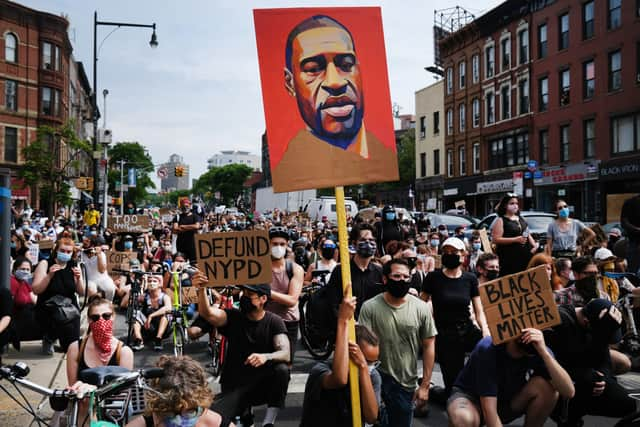George Floyd anniversary: what has changed in the US on third anniversary of Minneapolis murder?
and live on Freeview channel 276
The death of George Floyd was a moment which shocked the world three years ago.
Mr Floyd was killed by police officer Derek Chauvin on 25 May 2020. He was pulled over by cops on suspicion of using a counterfeit banknote at a nearby store.
Advertisement
Hide AdAdvertisement
Hide AdChauvin restrained Mr Floyd by pressing his knee on his neck with his fellow officers, Alexander Kueng and Thomas Lane, assisting Chauvin in restraining him and a fourth officer, Tou Thao, preventing bystanders from intervening. Coroners ruled Mr Floyd's died from cardiopulmonary arrest due to neck compression - Chauvin was sentenced to 22-and-a-half years in prison for manslaughter and murder, while his fellow cops have also been handed guilty convictions for aiding and abetting Chauvin.
His death sparked mass protests in the US and across the world against policy brutality. Demonstrators and campaigners called for major changes to the US policing system and, in some cases, called for police departments to be defunded.
But just how much has changed since Mr Floyd's murder in 2020?
What has changed since George Floyd’s death?
The murder of Mr Floyd sparked debate and conversations over the state of policing in the US. Protesters called for police departments across the country to be defunded, while on the other hand, conservatives called for a harsher crackdown on crime.
Advertisement
Hide AdAdvertisement
Hide AdIn the aftermath of Mr Floyd’s death, the Minneapolis Police Department (MPD) introduced new regulations for its officers. Drivers were no longer allowed to be pulled over by cops for having expired tags on their car or for having items hanging from their rearview mirror.
Officers nationwide have also been forbidden from using chokeholds or neck restraints to restrain suspects. This was introduced after Derek Chauvin used his knee to push down on the neck of Mr Floyd, leading to him uttering the words “I can’t breathe”.


Another major change in policing in the US post-2020 is the requirement for all officers to wear body-cams at all times in certain states such as New York, Colorado and New Jersey. The world of social media saw the arrest of Mr Floyd seen around the world, but in days gone by, the court would normally rely solely on the word of the police officer for a recollection of events - now body camera footage is often required in a court case to back up the claims of the officer.
However, while some measures have been introduced as a direct influence of the death of Mr Floyd, much still hasn’t budged. In the wake of the murder and surrounding protests, there was pressure to defund the city’s police department
Advertisement
Hide AdAdvertisement
Hide AdThe MPD, however, received a boosted budget of $196million in 2021, up $3m from the prior year. The 2022 budget was reduced to $187m but rose again in 2023 to $195m, with lawmakers citing rising costs.
Across the country, deaths at the hands of police officers have also continued to rise. According to Mapping Police Violence, 2022 became the deadliest year on record, with 1,176 people killed by law enforcement in the US - numbers have gradually risen to this level since 2017.
One of the major changes for police departments across the US is flailing staffing numbers.
The Minneapolis Police Department has seen a reduction of 317 officers on its books since Mr Floyd’s death in 2020, while the New York Police Department has seen the highest number of resignations in the past two decades over the past year.
Advertisement
Hide AdAdvertisement
Hide AdThe political landscape of the US has also evolved in the context and aftermath of Mr Floyd’s death in 2020. Protests and demonstrations have continued over police brutality towards black Americans, including in the cases of Daunte Wright, Andre Hill and Keenan Anderson, the cousin of the co-founder of the Black Lives Matter movement Patrisse Cullors.
However, opposition to this has also seen Conservative political figures grow their popularity. For example, Florida governor Ron DeSantis has gained voters on his platform of being tough on crime and “anti-woke”.
Comment Guidelines
National World encourages reader discussion on our stories. User feedback, insights and back-and-forth exchanges add a rich layer of context to reporting. Please review our Community Guidelines before commenting.
